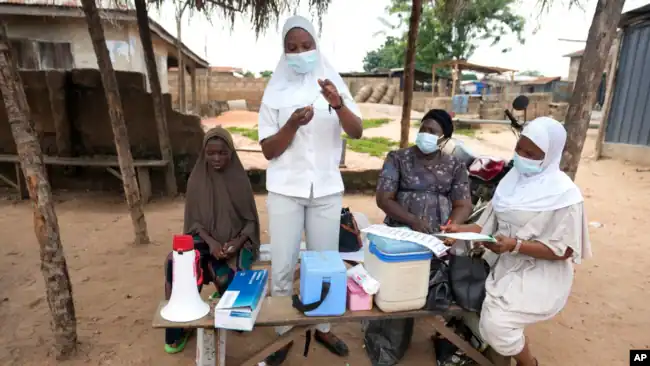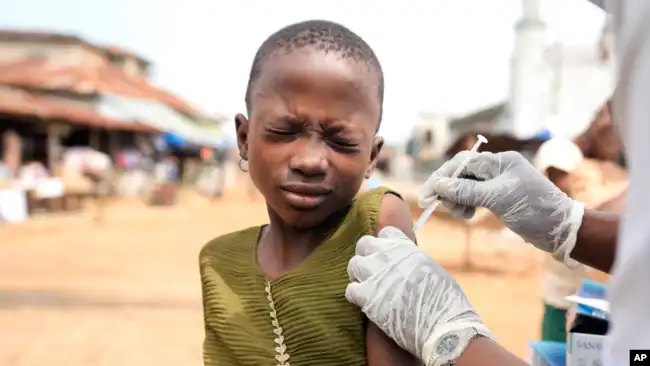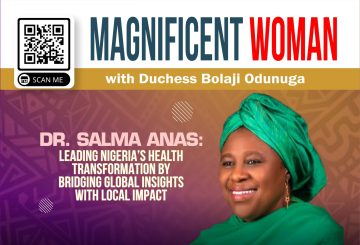In Sabo community, on the outskirts of Abuja, Nigeria, Yunusa Bawa dedicates his efforts to promoting the human papillomavirus (HPV) vaccine, which can prevent cervical cancer. Despite his endeavors, only a few parents agree to vaccinate their daughters daily. This hesitancy stems from a persistent rumor that the HPV vaccine causes infertility.

“The rumor is too much,” Bawa, 42, laments.
This challenge is not unique to Sabo. Across many African countries, health workers face similar obstacles in increasing HPV vaccine uptake. The World Health Organization (WHO) Africa office reports that approximately 25% of the population harbors doubts about the vaccine, reflecting a global pattern of initial resistance to HPV immunization.
HPV, a common sexually transmitted virus, can cause cervical cancer, other cancers, and genital warts. While most infections are benign, some lead to cancer if untreated. In 2020, cervical cancer claimed the lives of an average of 190 African women daily, representing 23% of global deaths from the disease. Africa has some of the highest cervical cancer rates worldwide, yet vaccination coverage remains low.
To date, 28 of Africa’s 54 countries have integrated the HPV vaccine into their immunization programs, but only five have achieved the 90% coverage goal set for 2030. Currently, just 33% of young African girls are vaccinated against HPV, a stark contrast to higher rates in Europe.
Emily Kobayashi, head of the HPV Program at Gavi, the Vaccine Alliance, emphasizes the critical role of vaccination in cervical cancer elimination. “The elimination strategy is a long game … but we know that vaccination is the strongest pillar and one of the easiest to implement,” she said.
However, the challenge lies in ensuring vaccines are administered, not just available. Charles Shey Wiysonge, head of the WHO’s vaccine-preventable diseases program in Africa, highlights the need for trusted community figures to dispel misinformation and promote vaccine uptake.
Vaccine hesitancy in Africa often stems from a lack of trust in government, exacerbated by conspiracy theories and misinformation spread by social media influencers and religious leaders. In Zimbabwe, where cervical cancer is prevalent, Village Health Workers combat vaccine hesitancy among religious sects that reject modern medicine in favor of spiritual remedies.
Despite the challenges, there are success stories. Rwanda, the first African country to launch a national HPV vaccination program in 2011, has achieved a 90% coverage rate through school-based campaigns and community outreach. Ethiopia has similarly high rates, leveraging religious leaders and educators to build trust. Mozambique and Tanzania have also made significant strides with comprehensive vaccination strategies.
In Nigeria, a major HPV vaccination campaign targeting nearly 15 million girls aged 9-14 recently began, supported by the United Nations children’s agency. The single-dose vaccine, endorsed by WHO’s African immunization advisory group, simplifies the regimen and encourages uptake.
Dr. Aisha Mustapha, a gynecologist in Kaduna state and a cervical cancer survivor, underscores the importance of education in conservative societies. Her personal experience enhances her advocacy efforts with religious leaders and community outreach. Mustapha employs creative methods, including comic books and songs, to make girls feel at ease and understand the vaccine’s benefits.
“The (cervical) cancer … is no respecter of any identity,” she asserts. “The vaccine is available, it is free, it is safe and effective.”
Through persistent education and community engagement, health workers like Bawa and Mustapha are paving the way for a healthier future, free from the shadow of cervical cancer.
- Tags: Africa, Emily Kobayashi, healthcare, Outbreaks, WHO, Yunusa Bawa





